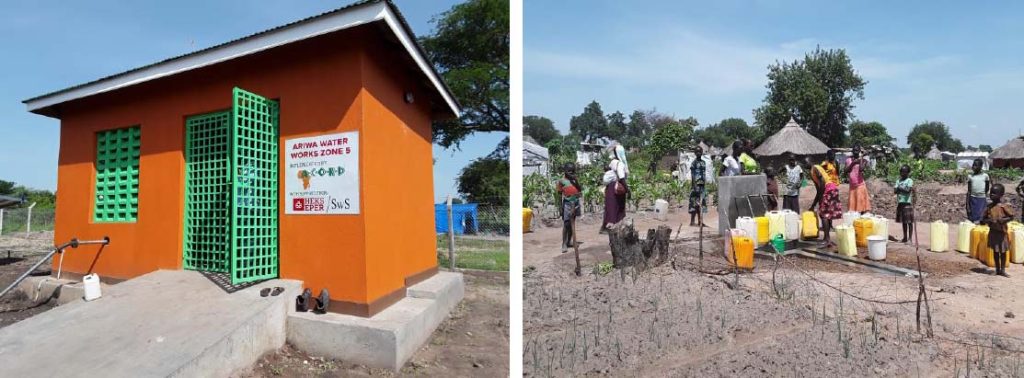A Case for Jerisa of Village 7 Zone 4 Bidibidi Settlement
Jerisa fetching water from a tap stand where she is a member of the water user committee in Village 7 zone 4. She maintains a vegetable garden near the same tap stand, shown in the background.
Jerisa Umunia is a South Sudanese refugee with a household of 8 people living in village 7, Zone 4 Bidibidi refugees’ settlement. She is a member of the water user committee for one of the tap stands located in village 7 where ACORD-U is supporting WASH Interventions. Before the ACORD-U supported water supply system was completed, she collected water from a 10,000 liter tank situated at the food distribution point in the centre of the village. This tank received water from water trucks fielded by UNHCR on a daily basis as the only source of water for the whole village. It was managed by hygiene promoters and the members of the RWCs.
She received training from ACORD-U in Operation and Maintenance (O&M) of water sources and she attested that the training has helped her know her role as a WUC member and that includes; fencing the water point, cleaning the compound of the water point and convening meetings of all the members of tap stands in case of any issue arising in regard to the water point.
She participates in sweeping or cleaning the water point area regularly and preventing children who come to collect water from playing on the tap stands and/ or damaging the water point. She also encourages fellow women to clean their water containers and to avoid washing their clothes near the tap stand and not create a muddy and dirty environment around the tap stand. From the conversation with her, it was clear that she was very aware of her role and was keen to implement whatever she was meant to.
She added that the refugee community is giving them respect in the work they do as water user committee members, especially in helping them to understand the safe water chain, the advantages of a clean water point, and using clean containers for collecting water.
She is giving thanks to ACORD-U for making water available in their village which has made them survive the hard times they went through during the emergency part of the humanitarian crisis. “Water is life without which we would have perhaps died by now,” she said.
The WASH project has brought a good relationship with the host community as they share and collect water from the same water source. This has brought peaceful co-existence between the refugees and the hosting communities. She is also thanking ACORD-U stressing that water is now near her home as opposed to those days when she had to travel for almost 1 km to the nearest seasonal stream. Now the water is less than 500m from the household and collecting water takes less than 30 minutes. She added that there is no more worry about being waylaid on the way to a water source by wrong elements that have intentions to rape. Husbands are more relaxed these days because they no longer worry that their wives are engaged in extramarital affairs under the pretext that they are collecting water.
She however cited some Gaps that are still in existence despite the numerous benefits from the water system:
- There is a need for more visibility required to be reinforced by, for instance, providing T-shirts to WUC members.
- More Distribution of hygiene related Non Food Items (NFIs) is required especially for the Jerricans which have become inadequate.
- In order to improve hygiene in the village, there is a need for a concrete platform at the tap stand for washing clothes and water collection containers.



